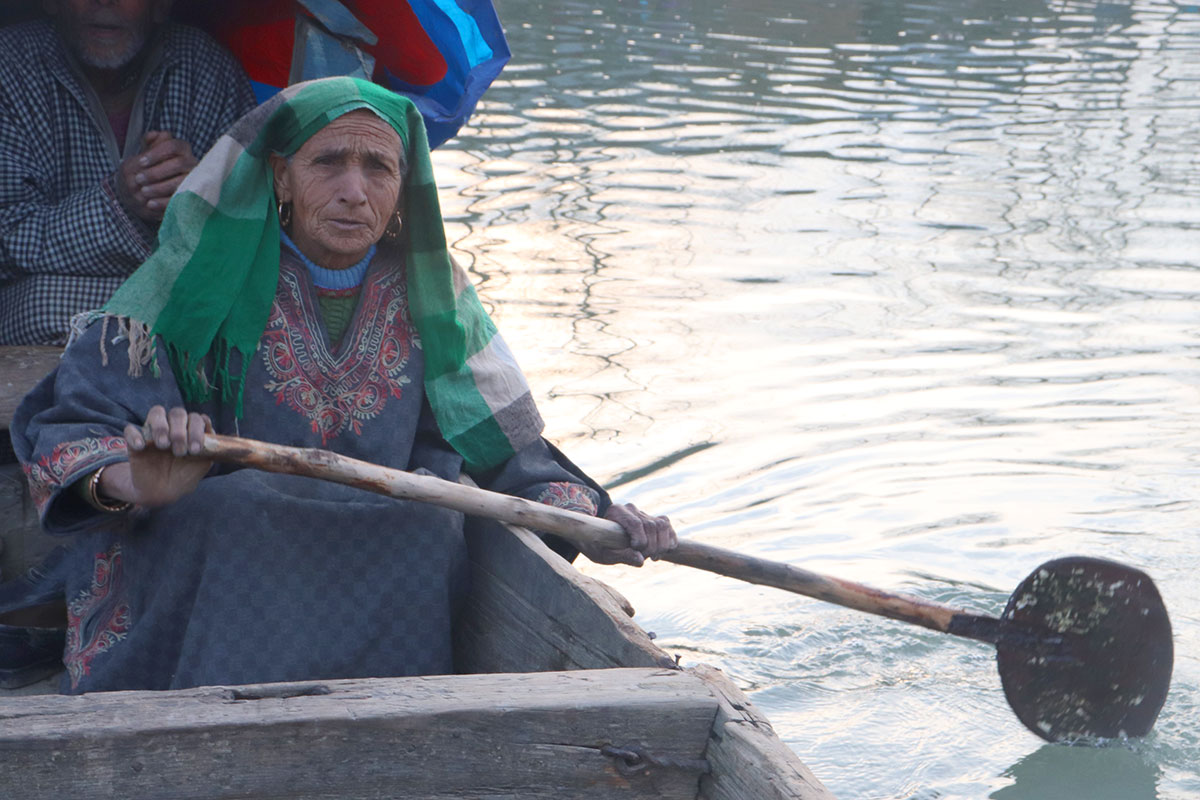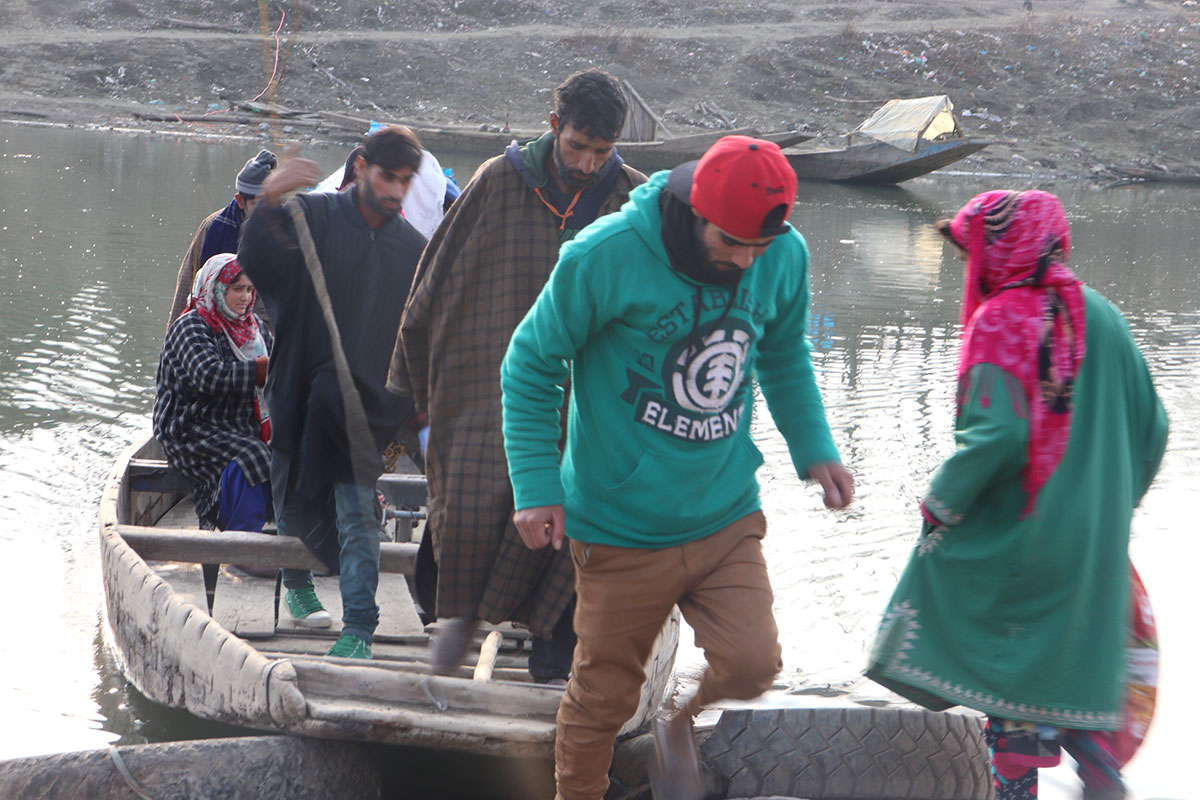A fisherwoman stopped going to sell her husband’s catch after situation prevented her leaving her five daughters unguarded at home. In 30 years, she changed her profile by emerging the solo carrier of the village to the other bank. But it has not improved her life much, reports Samreena Nazir

Every morning before the sun illuminates the world, Jana Begum leaves home and starts removing the accumulated water from her rundown wooden boat. If not removed, the water that gets in through the holes can sink the boat. The broken boat stays routinely tied with hooks to a stone ashore in Jhelum.
With water poured out, Jana collects her other essentials: the Hookah and the Kangri (Kashmiri fire pot) and put the two vitals in her separate berth in her boat. Part of the boat is covered by blue canvas and is Jan’s cabin.
Jana, 65, gazes towards the other bank of the river while pulling the oars with both her hands. Her traditional silver earrings touching the wrinkles of her face convey a long tail of hardships and reflect the struggle she does on a daily basis for surviving.
At 7 am, the river bank is crowded with the fisherwomen carrying their catch in wicker baskets. These women sell the fish by moving from door to door. These are the first group of commuters who travel in Jana’s boat. Along with them are a few students who are in dire need to reach their tuition classes.
Unlike other village women, Jana hardly does any household chorus like cooking and cleaning. Her whole day spends in carrying her fellow villagers from one side to the other side of the river.
For the past 30 years, Jana’s boat is literally the bridge of the village, connecting her village Aghanzpora to the main town of Awantipora. The village located on the Jhelum bank faces the shrine of Hazrat Syed Ahsan Mantaqi sahib in Awantipore. The ghat, the station wherefrom Jana rows her boat, is routinely crowded with women busy in dish-wash and washing clothes, some even use pitchers to fill the home water tanks.
Aghanzpora is home to almost 100 families who live in brick and mortar homes with modest economies. It has just a small provision shop and that is the key factor why the people use Jana’s boat more often to making quick basic shopping from Awantipore. Interestingly, the village has its graveyard on the other side of the river.
“We only sleep and eat in our own village,” Fazie, a resident of Gandhanji Mohalla said. “Even our dead are resting on the other side.”
In this situation, it is Jana who is the main carrier of the residents. Fazie said if they skip a boat ride to the other side, they will have to spend 20 minutes to reach the nearest bridge at Padgampora. “The boat takes us ashore in five minutes,” she said.
If rowing the boat is her job, it is not her choice, literally. Before the 1990s, it was Jana’s husband, Abdul Aziz Dar, who used to catch fish as Jana would go for selling the catch, next day. This would help the couple manage the household, they called home.
Their family comprised five daughters and two sons. When a new security situation emerged in Kashmir, Jana stopped moving out. A mother of five daughters, she told herself, should not leave the daughters unattended.
Her decision-making coincided with the decline of catch and Aziz’s health. Aziz was detected with a chest problem. He would feel breathless when exposed to the cold waves of the river. He is still alive but not in a position to make any contribution to the family.
“We are poor, and landless people lacking any savings or insurance,” Jana said. “For many days we had nothing to feed our children when my husband failed to net any fish.”
After Aziz was unable to net the fish, Jana looked towards his boat, perpetually parked ashore. One day, she decided to use this piece of movement. She put her foot into the boat and started ferrying villagers to the other side.
“I did not know the art of catching fish, so I used my husband’s fishing boat as a ferry,” Jana said. “Once I started, I never stopped.”
Since then, the name of the boat changed. It is now called Jani’s Henz Naauv (Jana’s boat). The interesting part about Jana’s ferry service is that the villagers don’t pay her in cash on a daily basis. It is a barter service. At the time of harvest, they pay her paddy and also the share of other crops they produce. With this income, Jana feeds her family.
Barter has been Kashmir’s traditional system of availing the basic services. Barbers, coppersmiths, mosque Imam’s, Friday preachers, boatmen and many others would usually be paid in kind at the time of the harvest. This system, however, has changed by the latter half of the twentieth century, especially because the cash crops pumped money into the peasantry.
Come winter, Jana’s family started receiving a bag full of paddy. The landless, however, pay whatever they may have. However, if a non-resident avails the services of Jana’s ferry, it would cost him Rs 10, per crossover. Sometimes, if Jana is not around in her boat, people row it to the other bank and keep it tied with a rope ashore. Rowing a boat comes naturally to the residents.
This boat has always proved a lifesaver for us,” resident, Mohammad Imran said. “During an emergency, it carries our patients and, sometimes, our coffins as well. Our children take joy rides on Eid and this boat is part of our life.”
Recently when a lady had to deliver her baby we carried her in the same boat instead of taking a long route that would have taken a long time, Imran added.
Despite being a literal bridge, Jana has not changed much. She lives in a deficiently constructed single-story house that was raised after the earlier one was taken away by the 2014 floods. It has three rooms but lacks windows. These window spaces are covered by polythene sheets. On its concrete veranda lies a pile of multi-coloured bags containing paddy, which she has received recently from villagers for the work she did for them, the whole last year.

The only change in the family is that she is not alone. Both her sons have grown up and they work as labourers with sand extractors. The elder son is actually living separately with his own family. He has five daughters to take care of.
Over the years, Jana has helped three of her five daughters to marry and settle in life. One of them, however, is embroiled in a dispute with her husband and is living with her poor parents for the last eight years. Their two younger sisters have dropped out of school and are managing the home when Jana is away rowing to the village to Awantipore.
“My two daughters are happily married in their homes but their marriage has landed me in debt of around two lakh rupees,” Jana said. “This is what is giving me sleepless nights.” Last winter, Jana regretted, she could not manage warm clothing for her youngest daughter. “The fact is that I put in the serious effort during the day and during the night my worries make mean insomniac,” Jana said. “But that is what life is all about.”















